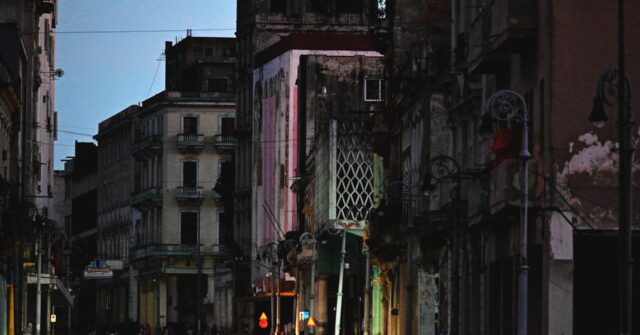Cuba is currently facing a severe crisis marked by a nationwide blackout that has left the vast majority of the country in darkness for several days. The situation escalated over the weekend when the power grid completely collapsed, further intensifying frustrations in a nation already plagued by chronic blackouts and deteriorating living conditions. Miguel Diaz-Canel, the figurehead president of Cuba, has publicly declared that the government “will not tolerate” protests amidst these challenges, signaling a willingness to suppress dissent as citizens increasingly take to the streets to express their discontent. The regime, however, remains largely insulated, with a significant number of wealthy citizens still managing to access power through independent generators.
Amidst the blackout, Hurricane Oscar made landfall in eastern Cuba, compounding the crisis for affected communities. Despite the urgency of the situation, Diaz-Canel convened a meeting of the National Defense Committee, where he issued a stern warning against any potential protests. He emphasized that while the government was prepared to address citizen concerns “in a civilized, organized, and disciplined manner,” any actions deemed disruptive would be met with force. This dichotomy between the state’s approach to public order and the escalating unrest reflects the deep divides in Cuban society, as many citizens find themselves struggling without electricity, food, and essential goods.
The response from the Cuban populace has been significant, with protests breaking out in towns across the nation, including the capital, Havana. Citizens are voicing their frustration openly, with reports suggesting that the government has tried to limit communication by restricting internet access to prevent the organization of larger demonstrations. Accounts from Havana residents indicate an overwhelming sense of desperation and anger directed at the ruling regime, which has consistently failed to provide basic necessities and maintain infrastructure. The resilience of the Cuban people is evident as they navigate the perilous landscape of civil unrest, calling on one another to unite against the struggles they face daily.
Beneath this atmosphere of unrest lies the stark reality for those caught in the middle of the crisis. State employees are being ordered to monitor protests and guard government buildings, reflecting the regime’s fear of unrest exacerbating its already precarious situation. Conversations with state workers reveal conflicting emotions, as some express deep-seated grievances against the regime while also fearing for their livelihoods. The economic constraints imposed by the ongoing crisis have left many in a bind, as they attempt to balance their duties with their moral beliefs about the unfolding events around them.
As frustrations linger, some citizens, like Mayra, a state official, have begun to challenge the regime’s narrative, refusing to suppress public outcry in defense of principles they hold dear. This has led to a growing sentiment among the population that the government is directly responsible for the dire situation—an assertion that Diaz-Canel dismisses by blaming the ongoing U.S. embargo for the failures of the power grid and the economy. Such claims, while simplistic, have been a long-standing tactic of the regime to shift the blame away from its mismanagement and corruption, leaving widespread discontent to fester among the citizenry.
The Cuban government’s missteps extend beyond the immediate power crisis, as it grapples with broader issues, including significant shortages of food, healthcare, and essential services. Despite attempts to portray a narrative of external factors sabotaging its efforts, the root causes of the crisis can be traced back to decades of communist governance that have led to systemic failures. As Cuba faces this critical juncture, the endurance of its citizens continues to be tested, and the potential for upheaval looms large as frustrations reach a boiling point. The resilience demonstrated by ordinary Cubans in the face of such adversity raises critical questions about the future of the regime and the possibility of significant change on the island.

